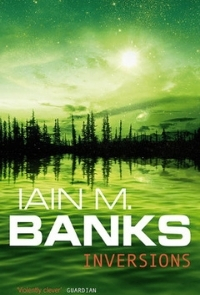
Inversions - Culture: Volume V
Written by: Iain M. Banks
Reviewed by: Brad Williamson
Genre: Science-Fiction / Pastoral
Score: 4/5
Unique among the series in that it deals entirely with a planet-bound race, and also in how few characters there are, Inversions in many ways is the simplest of all the Culture novels; that said, it has a complex spirit with deep, introspective themes and multifaceted personalities.
If you’re familiar with Banks, or with this series of reviews, you’ll know he usually deals with vast civilizations, way-faster-than-light travel, ancient interactions, god-like A.I., and galactic politics, among other recurring themes. For Inversions he ditches all of this. Sure, the reader knows the book still takes place in the galaxy of the Culture, which in itself adds complexity to the tale, but the characters don’t know about the Culture nor is the plot influenced by anything off-world.
In this respect the story is self-contained and thus very tightly told. In a sudden change for Banks, the atmosphere is almost pastoral, harkening back to such novels as Kim Stanley Robinson’s Three Californias trilogy, some of Asimov’s more reserved robot novels, specifically The Caves of Steel and The Naked Sun, and, though it may seem a strange comparison indeed, Samuel Delany’s Dhalgren.
But it’s not merely a retelling of old tropes by a master of other styles. Inversions is a great book in its own right, even outside the context of the Culture. Its combative though strangely cooperative storylines slowly converge while showing us more of this world, a supposed mirror of the thousands of other worlds from which more advanced civilizations originated from. It functions as a meta-tale that shows us one possible way in which a society like the Culture may have started. It poses questions of loyalty, origin—and whether or not one’s origin is important—, trust, history, what trust we can have in history’s claims, and ethics; it’s also a great planet-bound science-fiction tale among a universe of space travelers. Highly original, even compared to Banks’s usual output, and recommended.
Recent Comments